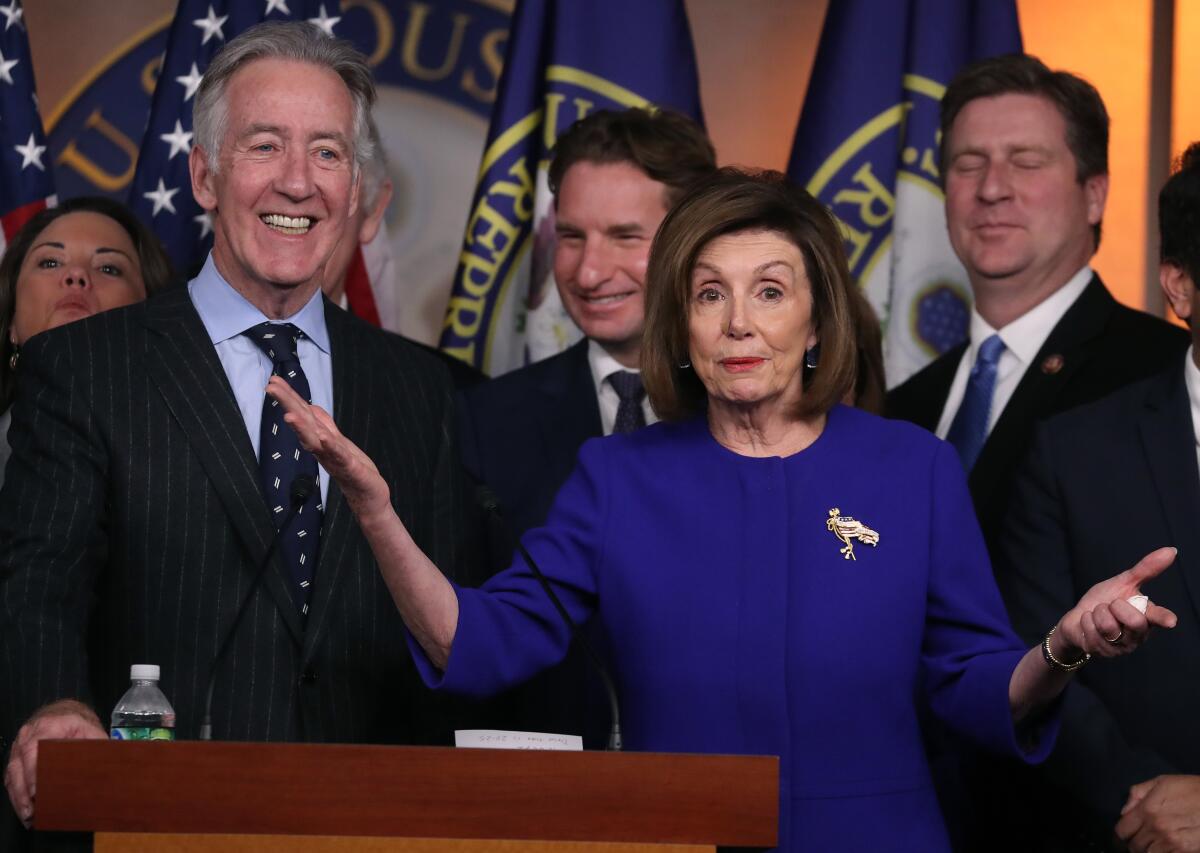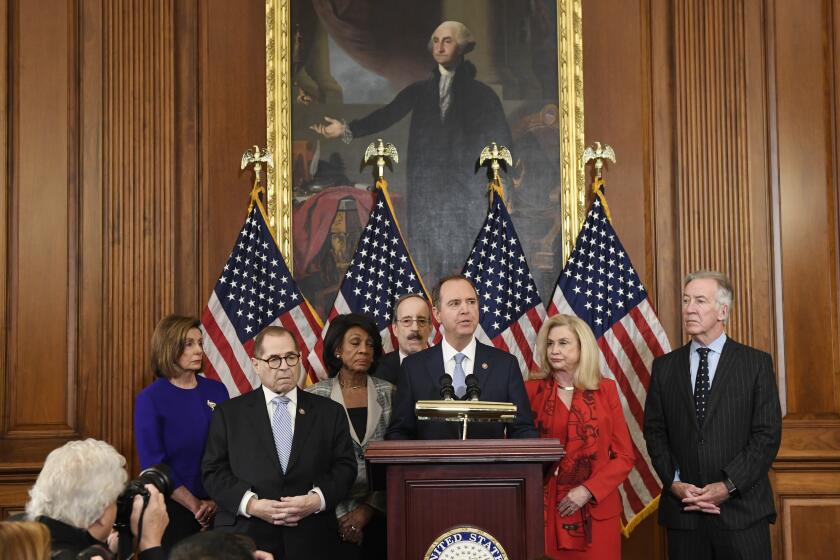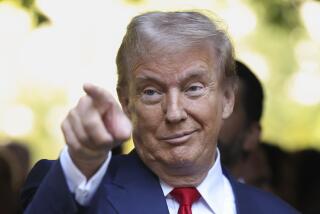White House and House Democrats reach accord on updated NAFTA

WASHINGTON — The White House and House Democrats reached a deal Tuesday that clears the way for passage of a revised North American free-trade pact, marking a rare bipartisan accomplishment that both sides see as a template for future U.S. trade agreements.
House Speaker Nancy Pelosi (D-San Francisco) announced the deal, saying it made the trade agreement that the administration negotiated last year with Mexico and Canada “infinitely better.” She particularly cited new enforcement provisions that include monitoring of Mexico’s labor practices and penalties for noncompliance.
Pelosi was flanked by fellow lawmakers, who noted that the two parties had come to agreement in a climate of extreme partisan rancor. Just an hour earlier, Pelosi and other Democrats had unveiled articles of impeachment against President Trump.
“Every once in a while you get to participate in a it-will-never-happen moment,” said Rep. Richard E. Neal (D-Mass.), chairman of the Ways and Means Committee, which oversees trade policy in the House.
Trump, in a morning tweet, hailed the prospect of completing one of his signature campaign promises:
“America’s great USMCA Trade Bill is looking good,” he said, referring to the United States-Mexico-Canada Agreement, the new name for the renegotiated North American Free Trade Agreement, or NAFTA.
Trump reached a deal last year with Mexico and Canada on USMCA, but Pelosi and other Democratic leaders refused to schedule a House vote until their demands were met, especially for stronger labor enforcement rules, which was the last major obstacle in advancing the accord.
Under Democratic pressure, the administration also beefed up rules on protecting the environment and dropped a provision that would have given drug companies 10 years of data exclusivity for certain drugs. Dropping the exclusivity could allow consumers in the future to have quicker access to generic drugs.
Despite grumbling from some Democrats that the deal did not go far enough, the agreement won support from key union leaders, including AFL-CIO chief Richard Trumka, as well as business groups. The House is expected to vote on USMCA next week and is all but certain to approve it. The Senate is likely to take it up after completing the impeachment trial in January, Majority Leader Mitch McConnell (R-Ky.) said.
The Mexican and Canadian legislatures will also need to vote on the agreement.
Robert Lighthizer, Trump’s chief trade official who led the negotiations with Canada and Mexico as well as with Congress, said in a statement that “we have created a deal that will benefit American workers, farmers, and ranchers for years to come.”
“This will be the model for American trade deals going forward,” he said.
Lighthizer and Jared Kushner, Trump’s son-in-law and a senior advisor, went to Mexico, where they participated in an upbeat signing session for the amended deal at the National Palace with Mexican President Andrés Manuel López Obrador and Canadian Deputy Prime Minister Chrystia Freeland.
“This is a great, economic, commercial and political agreement,” López Obrador declared during the signing ceremony.
While the trade pact does not directly address the difficult issue of immigration, the Mexican president said he hoped it could provide economic alternatives that would discourage people from leaving his country.
“This agreement strengthens cooperation for development and allows us to confront social problems like the phenomenon of migration in a better way,” López Obrador said. “We all know that whoever abandons his town, abandons his family, doesn’t do so by choice but out of necessity.”
USMCA would replace the quarter-century-old NAFTA, which many Democrats and other critics have blamed for a flight of production and jobs to Mexico, where wages are much lower and workers have had few organizing rights.
Labor groups and their allies agreed that the deal announced Tuesday is a clear improvement over the status quo or what the administration initially proposed, but some gave a more modest assessment of its potential impact.
“Trump’s claims that this new NAFTA will bring back hundreds of thousands of manufacturing jobs are absurd,” said Lori Wallach, director of Public Citizen’s Global Trade Watch. “Over time, the labor and environmental standards and enhanced enforcement terms may help raise wages in Mexico, and this may also reduce U.S. corporations’ incentives to outsource U.S. jobs to Mexico to pay workers less.”
Stephen Vaughn, who served as Lighthizer’s general counsel until April, said that USMCA and the stronger enforcement provisions showed that “people understand that trade deals have to be made more worker-friendly and better for the average person.”
“I think it’ll be very difficult to go back to the old way, given that this agreement looks like it will pass with a very large majority,” said Vaughn, now a partner at King & Spalding.
For Pelosi and other Democrats, who wanted to shape key elements of the trade agreement, ratifying the pact would provide a rare legislative accomplishment in a sharply divided Congress, allowing them to make a case to voters that they can legislate even during the impeachment process. Trump and Republican lawmakers have repeatedly criticized Pelosi and her colleagues in recent weeks for not passing the revised trade deal. Congressional Democrats argued that the revisions lacked sufficient enforcement terms to protect unions and workers’ rights in Mexico.
While some Democrats were loath to do Trump any political favors, Pelosi faced pressure from moderates, including freshman lawmakers in her party, who have worried they could pay a price if Congress did not pass a trade pact with America’s two largest trading partners.
House Democrats say they will impeach the president and then deliver on his coveted trade deal, testing the political ballast of both.
Trump hopes passage of the USMCA could help him with constituencies in the Midwest, where his trade war with China has hurt farmers and manufacturers.
As a candidate three years ago, Trump promised to overhaul trade policy. But he has had little to show for multiple tariffs and other extraordinary tactics he has used. Except for a small update to the U.S. trade pact with South Korea and a recent limited deal with Japan, he has been unable to win any deals.
The USMCA, though not a major overhaul of NAFTA, includes notable changes to rules governing production of automobiles and parts and resolving disputes between governments and private investors.
It also contains new or updated provisions on digital trade, financial services and other areas of commerce that were not major factors when NAFTA was enacted in 1994.
Tariffs in North America already were almost entirely removed by NAFTA, so the updated accord isn’t likely to have much impact on the pace of exports of U.S. farm goods to Mexico and Canada. At the same time, farmers have been unsettled by the trade war with China, and completing the North American trade agreement, some said, would reduce some of the worries about the future.
Even though Trump and the heads of Canada and Mexico formally signed the proposed USMCA more than a year ago, it was only in the last few months that Lighthizer began negotiating with a working group of House Democrats. He went back and forth in an effort to reach a compromise even as partisan rancor intensified in Washington over impeachment proceedings.
More recently Lighthizer stepped up the talks with Mexico. And throughout last week he and Mexico’s undersecretary for North America, Jesús Seade, were ensconced in meetings in Washington.
A key sticking point was including measures to ensure that Mexico complies with the trade agreements labor standards. U.S. and Mexican officials also wrangled over what kinds of steel would be allowed to meet the USMCA’s new requirement that 70% of the metal for car production be sourced in North America.
Mexican authorities and business owners balked at the idea of putting U.S. inspectors in Mexican plants as the Democrats suggested, calling that an infringement on their national sovereignty — always a sensitive issue in relations with their bigger American neighbor.
The new labor enforcement terms, as released by Democrats on Tuesday, said there would be an “inter-agency committee” to monitor Mexico’s implementation of labor reform, with “labor attaches” based in Mexico to provide “on-the-ground information about Mexico’s labor practices.” Failure to comply with key benchmarks would lead to “enforcement action,” although it wasn’t clear whether that would include stopping goods at the border, which labor advocates sought and Mexico resisted.
“The question is how the sanctions work if you violate the agreement, and how and who does it. That’s to be seen,” said Mickey Kantor, the U.S. trade representative under President Clinton who concluded the negotiations on the original NAFTA.
The Mexican Senate was briefed on the deal over the weekend. And on Monday, López Obrador, expressing optimism that an agreement was at hand, urged U.S. legislators to act swiftly before next year’s election season comes into full swing.
“Very respectfully, I say we don’t want this very important issue for the economies of three nations to be connected, to mix with, political-electoral matters,” he told reporters.
Lee and Stokols reported from Washington and McDonnell from Mexico City. Times staff writer Jennifer Haberkorn in Washington and Cecilia Sanchez in The Times’ Mexico City bureau contributed to this report.
More to Read
Get the L.A. Times Politics newsletter
Deeply reported insights into legislation, politics and policy from Sacramento, Washington and beyond. In your inbox three times per week.
You may occasionally receive promotional content from the Los Angeles Times.












